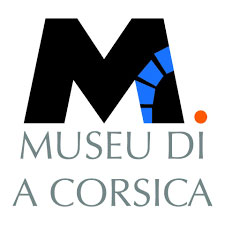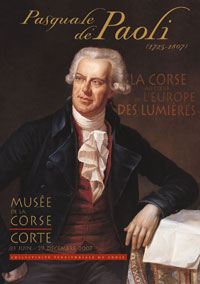Corsica in the heart of the Europe of the Enlightenment.
This exhibition was organized on the occasion of the bicentenary of the death of Pasquale de’Paoli, head of state, humanist and general, celebrated by the intellectual and political Europe of the Enlightenment.
More than 200 works and documents from England, Scotland, France, Italy and the Vatican recall the astonishing destiny of a precursor whose memory and action have been obscured in France, except for Corsica of course.
Let’s hope that this exhibition, as well as the very documented publication that accompanies it, will contribute to reinstate in the place he deserves this herald of universal values and freedom, initiator of the Corsican Constitution and one of the inspirers of the American one of George Washington.
“All Europe is Corsican”.
This sentence of Voltaire summarizes the thought of the contemporaries, allies or adversaries of the general of the Corsicans, about Paoli, whose legend, during his life, fascinates the Europe of the Lights. Born in Morosaglia in 1725, at the age of 14 he accompanied in exile, his father Hyacinthe, one of the Corsican insurgents claiming the independence of the island to the Genoese. In Naples, he attended the Royal Academy and joined the Royal Farnese. Influenced by the thought of Genovesi, he drew from his studies a taste for history and the ancients (Titus Livius, Polybius and Plutarch), a republican culture drawn from Machiavelli and a particular attachment to the English Constitution, which he knew from the reading of Montesquieu’s Spirit of the Laws and from various English authors. Throughout his life, he would strive to put into practice the precepts of these philosophers and the ideals of his youth.
“For us, the people is the whole nation (…) Equality must not be an empty word”.
In 1755, Paoli returns in Corsica to take the head of the insurrection against the Genoese and he is elected on July 14 and 15 general of the Nation. From November, founding the first democratic State of the Europe of the Lights, he proclaims a constitution, which stipulates in particular the sovereign people as only legitimate source of power and the equality in front of the law. During fourteen years of government, Paoli will affirm the existence of a nation, mint a currency, create a fleet, raise an army and found a university.
An international fame
Paoli’s activities interested the American Insurgents, fascinated B. Franklin, one of the fathers of the American Revolution of 1776, as well as Jefferson, so much so that even today his bust remains on display in the house of the third President of the United States in Monticello, Virginia. Popularized by James Boswell in An account of Corsica, his action created an infatuation in all enlightened Europe to the point that Rousseau considered for a time to participate in the elaboration of the future constitution that Paoli planned for Corsica in 1764.
The defeat and the glory
In the summer of 1768, the French troops organized the conquest of Corsica. After several months of resistance, Louis XV sent an army of 22.000 men who defeated the paolist troops in the battle of Ponte Novu on May 8, 1769. Corsica lost its independence once again. Paoli leaves the island, and crosses Europe to join London. During this exceptional journey, he met an enthusiastic welcome. He is “the paladin of the Freedom”, received by the authorities of the various States and the great intellectuals of his time, like Goethe.
An exile of “head of state
Begin then long years of exile in England where Paoli is received like a head of state. There he met all the great minds of England, Samuel Johnson and Joshua Reynolds, Daniel Defoe, Edmund Burke and John Pringle. He was painted by Lawrence and Cosway, sculpted by Cerrachi and Flaxman. Paoli led an intense social life and joined very closed clubs, the Literary Club or the Royal Society; a Freemason, he was admitted in 1778 to the Lodge of the Nine Muses, visited Boswell in Scotland and discovered England at the beginning of the Industrial Revolution.
Paoli at the time of the French Revolution
In 1789, the Corsican revolutionaries ask for the return of the great man to the Constituent Assembly. On November 30, the Assembly, while affirming that Corsica is henceforth “integral part of the French Empire”, what Paoli accepts, proclaims the necessary return of the exiles. Paoli returns to Paris where he meets Louis XVI; he is introduced in the French society by La Fayette, Mirabeau and Robespierre who declares to the Corsicans: “Generous citizens, you defended freedom in a time when we did not dare to hope for it yet. You suffered for it; you triumph with it and your triumph is ours”. After having publicly expressed his attachment to the ideas of the Revolution which begins, Paoli begins a triumphal crossing of France; he arrives in Corsica, henceforth French department, on July 14, 1790, where he is acclaimed, among others, by the young Napoleon Bonaparte. All the powers, administrative, political and military are given to him. But, he was almost 70 years old and the agreement was difficult with the young revolutionaries of the island, the Bonapartes, Arena, Saliceti, Pozzo di Borgo. He supports the application of the Civil Constitution of the clergy, installs the new revolutionary administration. In the summer of 1792, confronted with his succession, Paoli does not decide between the pretenders, Christophe Saliceti and Charles-André Pozzo di Borgo.
From the rupture to the exile
In 1793, Paoli, worried about the risk to see the Convention imposing its decisions by force on Corsica, broke with the Republic, and asked England. Considered as a traitor, he was deprived of his command by Paris. An Anglo-Corsican Kingdom placed under the authority of an English viceroy was constituted in 1794, before Bonaparte’s troops took over the island. At the end of 1795, Paoli returned once again to England, where he died in exile in February 1807.
Curator: Luigi Mascilli Migliorini, Professor of Modern History at the University of Naples L’Orientale.
Scenography: Yves Kneusé, architect-scenographer
President of the scientific council: Antoine-Marie Graziani, university professor at the IUFM of Corsica, historian and writer




